Enhancing Healthcare through Communication and Mentoring Programs
VerifiedAdded on 2023/06/04
|5
|761
|131
Essay
AI Summary
This essay discusses the importance of effective mentoring in healthcare organizations, highlighting its role in developing leaders and ensuring workforce competence. It examines the benefits and drawbacks of both formal and informal mentoring programs, noting how formal programs enhance job performance and networking, while informal mentoring fosters career growth and psychosocial support. The essay emphasizes the crucial role of communication in mentoring relationships for problem-solving, knowledge sharing, and leadership development, ultimately contributing to quality and safe care. It concludes that mentoring programs, supported by strong communication, are essential for career development in the nursing profession, enabling mentees to take responsibility and advance their skills.
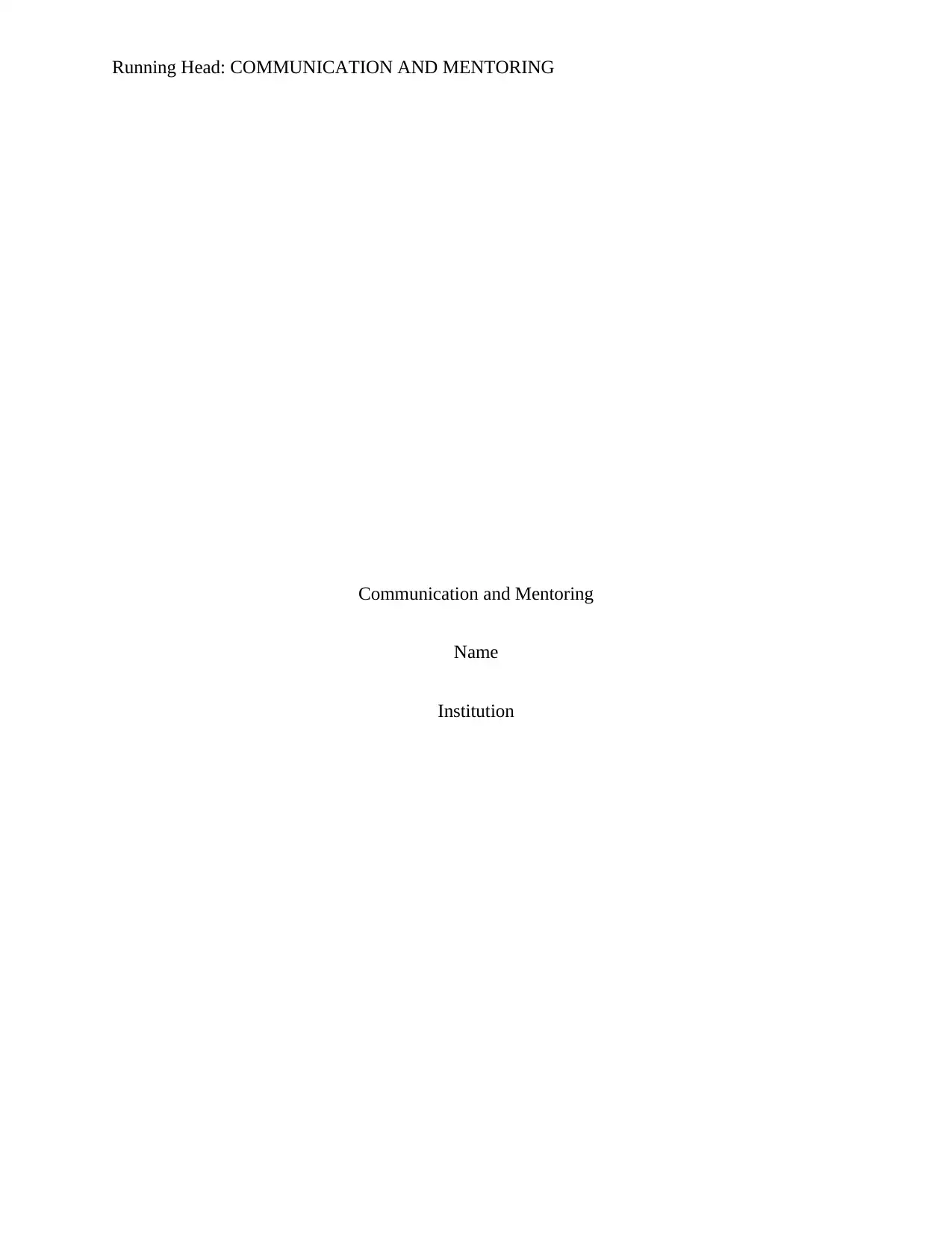
Running Head: COMMUNICATION AND MENTORING
Communication and Mentoring
Name
Institution
Communication and Mentoring
Name
Institution
Paraphrase This Document
Need a fresh take? Get an instant paraphrase of this document with our AI Paraphraser
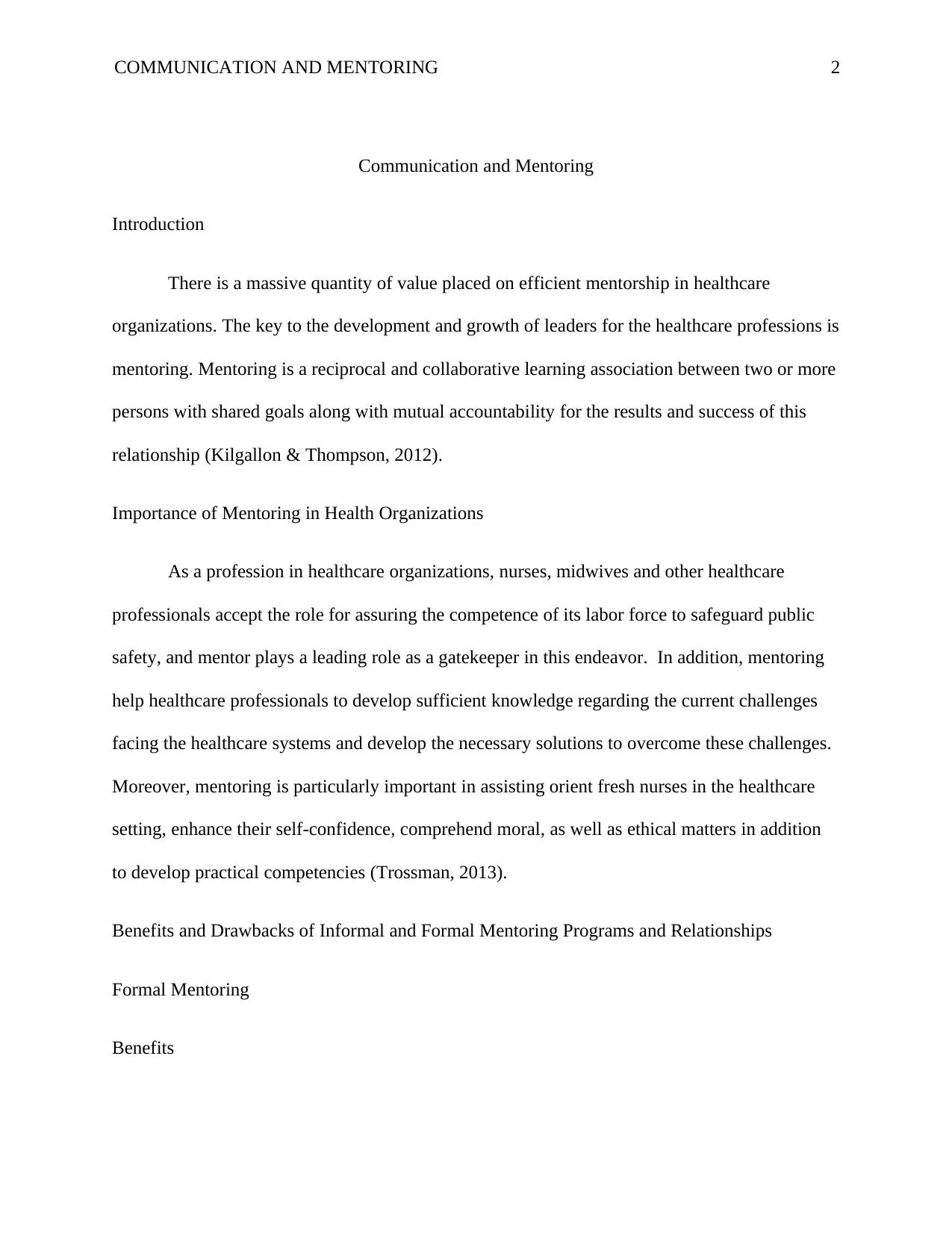
COMMUNICATION AND MENTORING 2
Communication and Mentoring
Introduction
There is a massive quantity of value placed on efficient mentorship in healthcare
organizations. The key to the development and growth of leaders for the healthcare professions is
mentoring. Mentoring is a reciprocal and collaborative learning association between two or more
persons with shared goals along with mutual accountability for the results and success of this
relationship (Kilgallon & Thompson, 2012).
Importance of Mentoring in Health Organizations
As a profession in healthcare organizations, nurses, midwives and other healthcare
professionals accept the role for assuring the competence of its labor force to safeguard public
safety, and mentor plays a leading role as a gatekeeper in this endeavor. In addition, mentoring
help healthcare professionals to develop sufficient knowledge regarding the current challenges
facing the healthcare systems and develop the necessary solutions to overcome these challenges.
Moreover, mentoring is particularly important in assisting orient fresh nurses in the healthcare
setting, enhance their self-confidence, comprehend moral, as well as ethical matters in addition
to develop practical competencies (Trossman, 2013).
Benefits and Drawbacks of Informal and Formal Mentoring Programs and Relationships
Formal Mentoring
Benefits
Communication and Mentoring
Introduction
There is a massive quantity of value placed on efficient mentorship in healthcare
organizations. The key to the development and growth of leaders for the healthcare professions is
mentoring. Mentoring is a reciprocal and collaborative learning association between two or more
persons with shared goals along with mutual accountability for the results and success of this
relationship (Kilgallon & Thompson, 2012).
Importance of Mentoring in Health Organizations
As a profession in healthcare organizations, nurses, midwives and other healthcare
professionals accept the role for assuring the competence of its labor force to safeguard public
safety, and mentor plays a leading role as a gatekeeper in this endeavor. In addition, mentoring
help healthcare professionals to develop sufficient knowledge regarding the current challenges
facing the healthcare systems and develop the necessary solutions to overcome these challenges.
Moreover, mentoring is particularly important in assisting orient fresh nurses in the healthcare
setting, enhance their self-confidence, comprehend moral, as well as ethical matters in addition
to develop practical competencies (Trossman, 2013).
Benefits and Drawbacks of Informal and Formal Mentoring Programs and Relationships
Formal Mentoring
Benefits
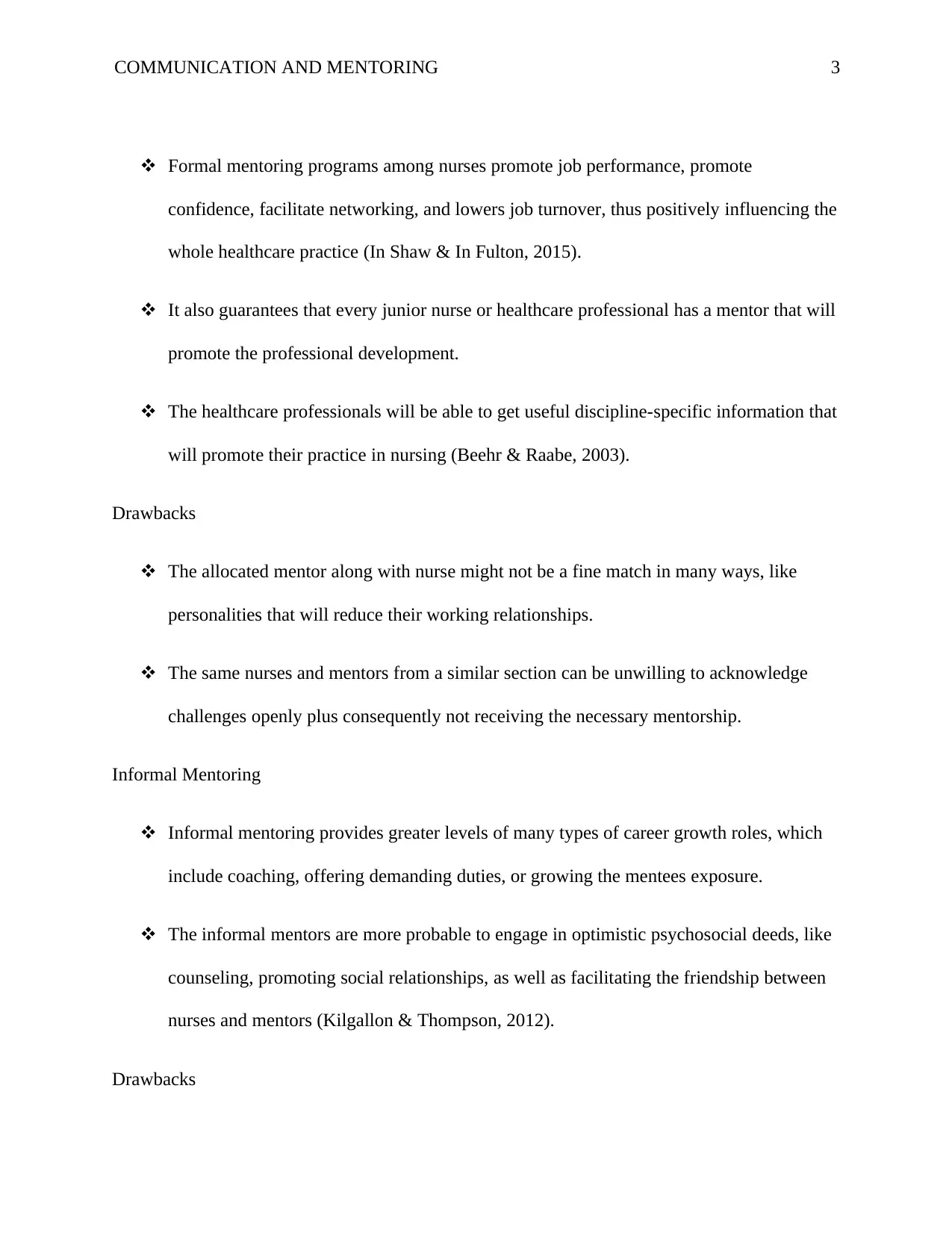
COMMUNICATION AND MENTORING 3
Formal mentoring programs among nurses promote job performance, promote
confidence, facilitate networking, and lowers job turnover, thus positively influencing the
whole healthcare practice (In Shaw & In Fulton, 2015).
It also guarantees that every junior nurse or healthcare professional has a mentor that will
promote the professional development.
The healthcare professionals will be able to get useful discipline-specific information that
will promote their practice in nursing (Beehr & Raabe, 2003).
Drawbacks
The allocated mentor along with nurse might not be a fine match in many ways, like
personalities that will reduce their working relationships.
The same nurses and mentors from a similar section can be unwilling to acknowledge
challenges openly plus consequently not receiving the necessary mentorship.
Informal Mentoring
Informal mentoring provides greater levels of many types of career growth roles, which
include coaching, offering demanding duties, or growing the mentees exposure.
The informal mentors are more probable to engage in optimistic psychosocial deeds, like
counseling, promoting social relationships, as well as facilitating the friendship between
nurses and mentors (Kilgallon & Thompson, 2012).
Drawbacks
Formal mentoring programs among nurses promote job performance, promote
confidence, facilitate networking, and lowers job turnover, thus positively influencing the
whole healthcare practice (In Shaw & In Fulton, 2015).
It also guarantees that every junior nurse or healthcare professional has a mentor that will
promote the professional development.
The healthcare professionals will be able to get useful discipline-specific information that
will promote their practice in nursing (Beehr & Raabe, 2003).
Drawbacks
The allocated mentor along with nurse might not be a fine match in many ways, like
personalities that will reduce their working relationships.
The same nurses and mentors from a similar section can be unwilling to acknowledge
challenges openly plus consequently not receiving the necessary mentorship.
Informal Mentoring
Informal mentoring provides greater levels of many types of career growth roles, which
include coaching, offering demanding duties, or growing the mentees exposure.
The informal mentors are more probable to engage in optimistic psychosocial deeds, like
counseling, promoting social relationships, as well as facilitating the friendship between
nurses and mentors (Kilgallon & Thompson, 2012).
Drawbacks
⊘ This is a preview!⊘
Do you want full access?
Subscribe today to unlock all pages.

Trusted by 1+ million students worldwide
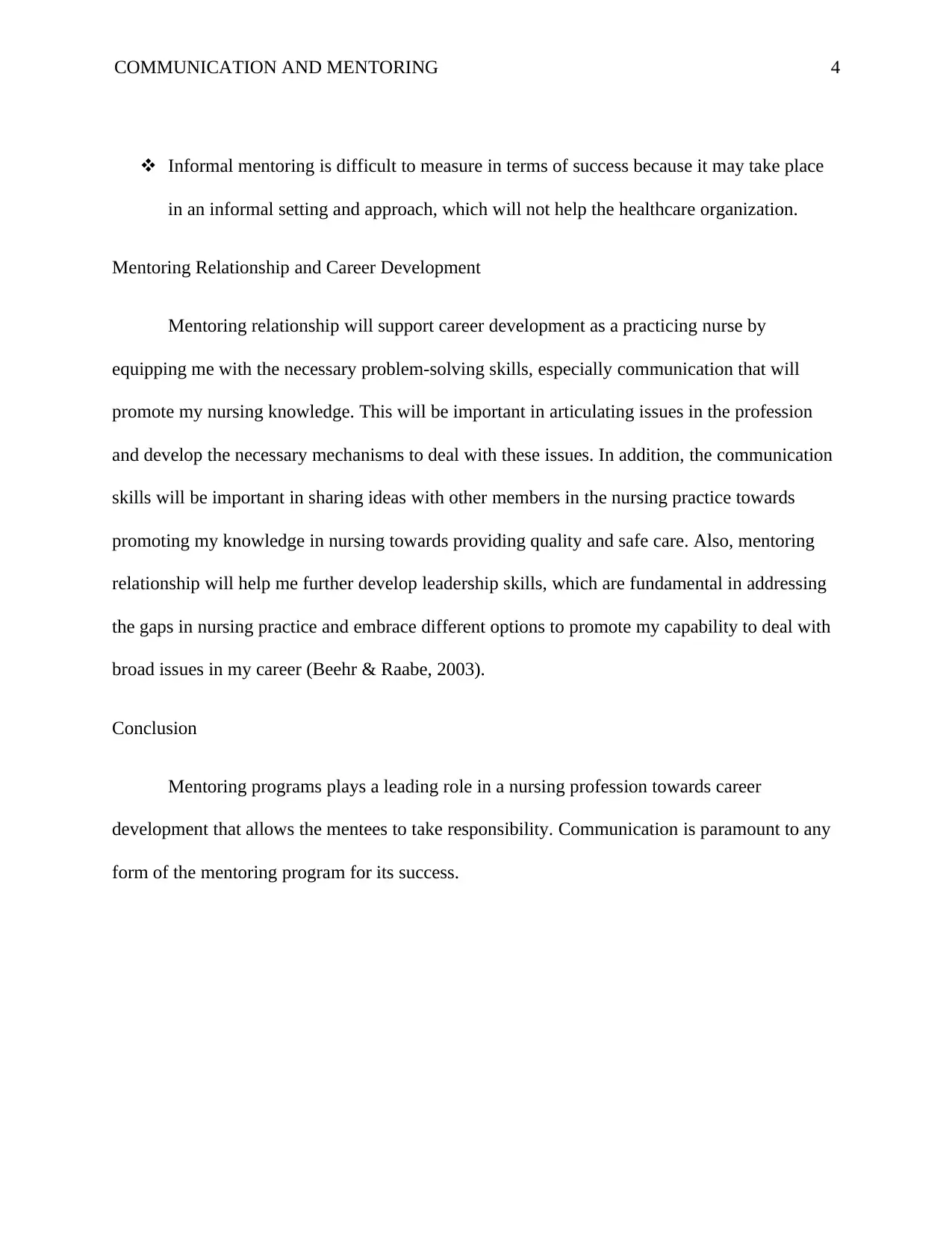
COMMUNICATION AND MENTORING 4
Informal mentoring is difficult to measure in terms of success because it may take place
in an informal setting and approach, which will not help the healthcare organization.
Mentoring Relationship and Career Development
Mentoring relationship will support career development as a practicing nurse by
equipping me with the necessary problem-solving skills, especially communication that will
promote my nursing knowledge. This will be important in articulating issues in the profession
and develop the necessary mechanisms to deal with these issues. In addition, the communication
skills will be important in sharing ideas with other members in the nursing practice towards
promoting my knowledge in nursing towards providing quality and safe care. Also, mentoring
relationship will help me further develop leadership skills, which are fundamental in addressing
the gaps in nursing practice and embrace different options to promote my capability to deal with
broad issues in my career (Beehr & Raabe, 2003).
Conclusion
Mentoring programs plays a leading role in a nursing profession towards career
development that allows the mentees to take responsibility. Communication is paramount to any
form of the mentoring program for its success.
Informal mentoring is difficult to measure in terms of success because it may take place
in an informal setting and approach, which will not help the healthcare organization.
Mentoring Relationship and Career Development
Mentoring relationship will support career development as a practicing nurse by
equipping me with the necessary problem-solving skills, especially communication that will
promote my nursing knowledge. This will be important in articulating issues in the profession
and develop the necessary mechanisms to deal with these issues. In addition, the communication
skills will be important in sharing ideas with other members in the nursing practice towards
promoting my knowledge in nursing towards providing quality and safe care. Also, mentoring
relationship will help me further develop leadership skills, which are fundamental in addressing
the gaps in nursing practice and embrace different options to promote my capability to deal with
broad issues in my career (Beehr & Raabe, 2003).
Conclusion
Mentoring programs plays a leading role in a nursing profession towards career
development that allows the mentees to take responsibility. Communication is paramount to any
form of the mentoring program for its success.
Paraphrase This Document
Need a fresh take? Get an instant paraphrase of this document with our AI Paraphraser
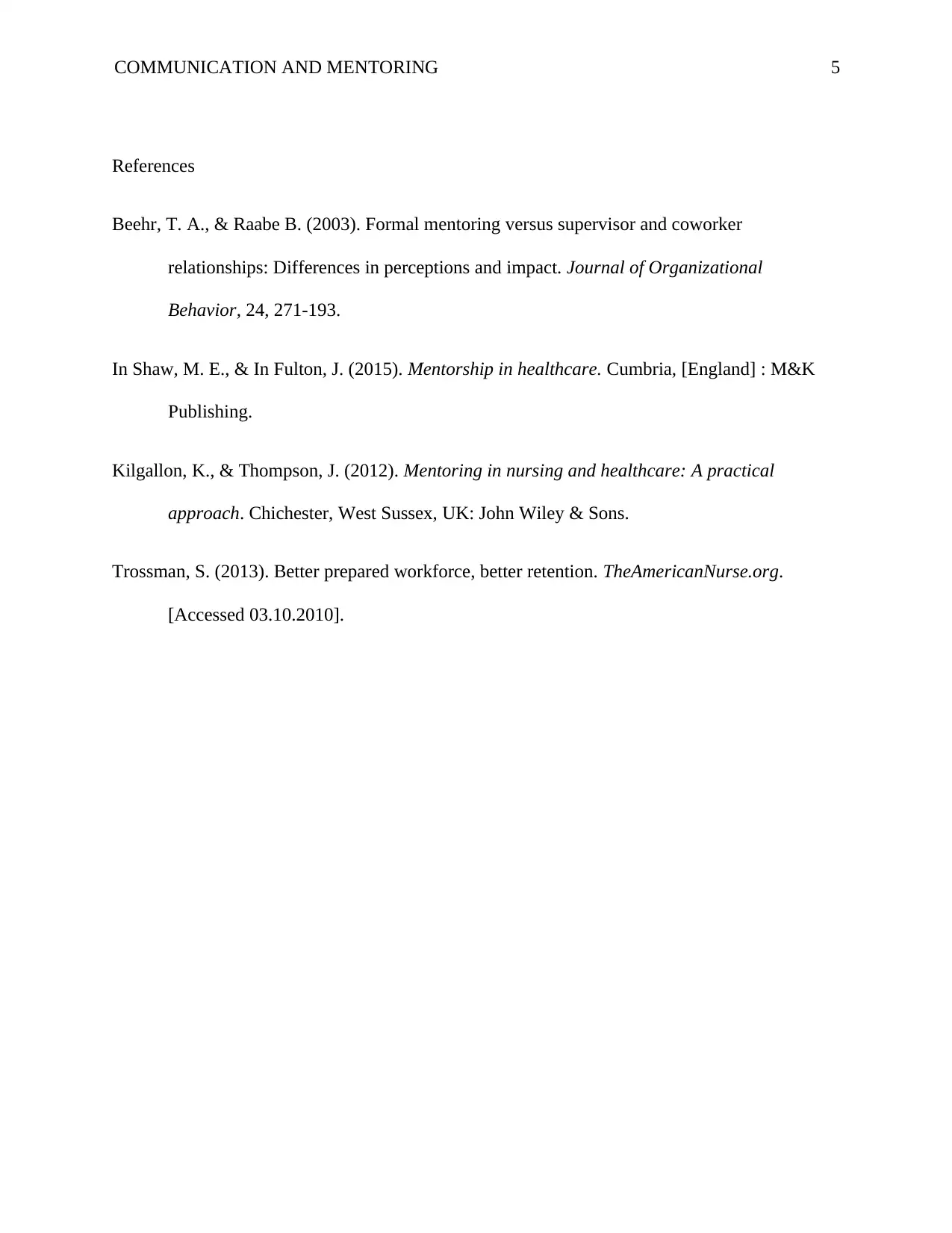
COMMUNICATION AND MENTORING 5
References
Beehr, T. A., & Raabe B. (2003). Formal mentoring versus supervisor and coworker
relationships: Differences in perceptions and impact. Journal of Organizational
Behavior, 24, 271-193.
In Shaw, M. E., & In Fulton, J. (2015). Mentorship in healthcare. Cumbria, [England] : M&K
Publishing.
Kilgallon, K., & Thompson, J. (2012). Mentoring in nursing and healthcare: A practical
approach. Chichester, West Sussex, UK: John Wiley & Sons.
Trossman, S. (2013). Better prepared workforce, better retention. TheAmericanNurse.org.
[Accessed 03.10.2010].
References
Beehr, T. A., & Raabe B. (2003). Formal mentoring versus supervisor and coworker
relationships: Differences in perceptions and impact. Journal of Organizational
Behavior, 24, 271-193.
In Shaw, M. E., & In Fulton, J. (2015). Mentorship in healthcare. Cumbria, [England] : M&K
Publishing.
Kilgallon, K., & Thompson, J. (2012). Mentoring in nursing and healthcare: A practical
approach. Chichester, West Sussex, UK: John Wiley & Sons.
Trossman, S. (2013). Better prepared workforce, better retention. TheAmericanNurse.org.
[Accessed 03.10.2010].
1 out of 5
Related Documents
Your All-in-One AI-Powered Toolkit for Academic Success.
+13062052269
info@desklib.com
Available 24*7 on WhatsApp / Email
![[object Object]](/_next/static/media/star-bottom.7253800d.svg)
Unlock your academic potential
Copyright © 2020–2026 A2Z Services. All Rights Reserved. Developed and managed by ZUCOL.





